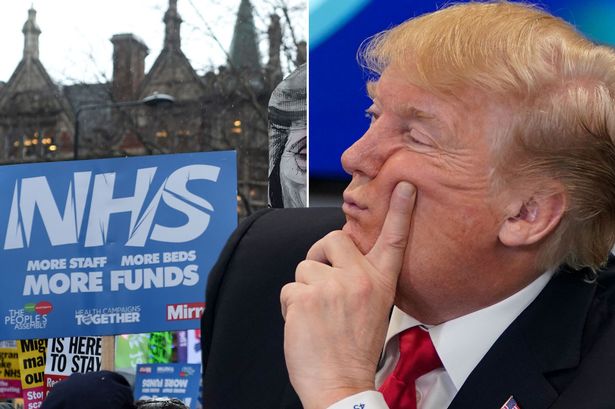Health
Trump and Pharma Pressure UK Government on NHS Drug Pricing

Campaigners have raised alarms over the potential impact of Donald Trump’s threats on the National Health Service (NHS) in the UK. They warn that the former U.S. President and major pharmaceutical companies could impose exorbitant drug prices that may jeopardize the NHS’s financial stability. The advocacy group Global Justice Now has called on the UK government to resist pressures to raise drug costs, fearing that capitulating to these demands could lead to severe financial strain on the NHS.
Recent reports indicate that Americans pay approximately four times more for medications than their British counterparts. Global Justice Now’s director, Nick Deardon, highlighted this disparity in a piece for the Mirror, stating, “These high prices leave many ordinary Americans with a horrible choice – go without the treatment they need or be forced into poverty and debt.” He criticized Trump’s characterization of the UK as “freeloaders,” arguing that it reflects a misunderstanding of the underlying issues in U.S. drug pricing.
In a related development, British pharmaceutical firm AstraZeneca announced on March 15, 2024, that it is increasing its investment in a manufacturing site in the United States to £3.3 billion. This decision follows a ruling by the UK regulators indicating no evidence of cartel-like behavior among major drug companies regarding their threats to withdraw from the UK market.
As tensions rise, Merck and Eli Lilly have halted investments exceeding £1.3 billion in the UK, citing disputes over NHS pricing structures. Merck recently abandoned a £900 million research and development center that was underway, while AstraZeneca paused a £170 million investment in its Cambridge site.
The ongoing negotiations over NHS pricing are critical, as the NHS has historically leveraged its collective bargaining power to secure lower drug prices compared to the private sector in the United States. Reports suggest that the UK government is considering raising the NHS “value for money” threshold by 25% as part of its discussions with the Trump administration. An anonymous source close to the negotiations informed Politico that the government appears to be yielding to pressure from pharmaceutical companies.
Concerns about the implications of these negotiations extend beyond just pricing. Experts have warned that higher drug costs would divert NHS funds away from essential services, such as staffing and hospital beds. Previous research published in the Lancet indicated that the current pricing threshold set by the National Institute for Health and Care Excellence (NICE) may already be too high, further complicating the situation.
The potential for increased tariffs on the UK by the Trump administration if demands are not met has heightened anxieties among NHS advocates. Deardon emphasized the need for the UK government to resist these pressures, stating, “The Government must not give in. We gain nothing from diverting precious NHS funds into the pockets of some of the richest companies in the world.”
With pharmaceutical companies facing increasing scrutiny, Global Justice Now, along with other organizations, has urged the UK’s Competition and Markets Authority (CMA) to investigate possible anti-competitive behavior among these firms. The CMA has responded by stating that it has not found direct evidence of collusion among the pharmaceutical companies regarding their public announcements about potential withdrawals from the UK market.
As discussions continue, the future of the NHS and its ability to provide affordable medications hangs in the balance. Advocates argue that the UK must prioritize its healthcare needs rather than submit to external pressures, asserting that a reformed approach to drug pricing and production is essential for safeguarding public health.
In conclusion, the ongoing negotiations between the UK government, Trump, and pharmaceutical giants raise critical questions about the future of drug pricing and access to essential medicines. The outcome of these discussions will undoubtedly have far-reaching implications for the NHS and the health of millions of patients in the UK.
-

 Health3 months ago
Health3 months agoNeurologist Warns Excessive Use of Supplements Can Harm Brain
-

 Health3 months ago
Health3 months agoFiona Phillips’ Husband Shares Heartfelt Update on Her Alzheimer’s Journey
-

 Science1 month ago
Science1 month agoBrian Cox Addresses Claims of Alien Probe in 3I/ATLAS Discovery
-

 Science1 month ago
Science1 month agoNASA Investigates Unusual Comet 3I/ATLAS; New Findings Emerge
-

 Science4 weeks ago
Science4 weeks agoScientists Examine 3I/ATLAS: Alien Artifact or Cosmic Oddity?
-

 Entertainment4 months ago
Entertainment4 months agoKerry Katona Discusses Future Baby Plans and Brian McFadden’s Wedding
-

 Science4 weeks ago
Science4 weeks agoNASA Investigates Speedy Object 3I/ATLAS, Sparking Speculation
-

 Entertainment4 months ago
Entertainment4 months agoEmmerdale Faces Tension as Dylan and April’s Lives Hang in the Balance
-

 World3 months ago
World3 months agoCole Palmer’s Cryptic Message to Kobbie Mainoo Following Loan Talks
-

 Science4 weeks ago
Science4 weeks agoNASA Scientists Explore Origins of 3I/ATLAS, a Fast-Moving Visitor
-

 Entertainment4 months ago
Entertainment4 months agoLove Island Star Toni Laite’s Mother Expresses Disappointment Over Coupling Decision
-

 Entertainment3 months ago
Entertainment3 months agoMajor Cast Changes at Coronation Street: Exits and Returns in 2025









